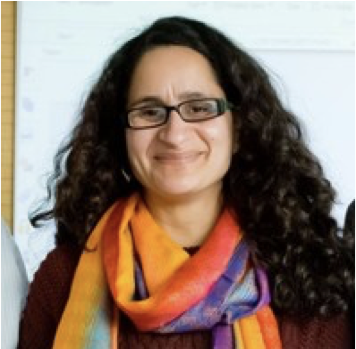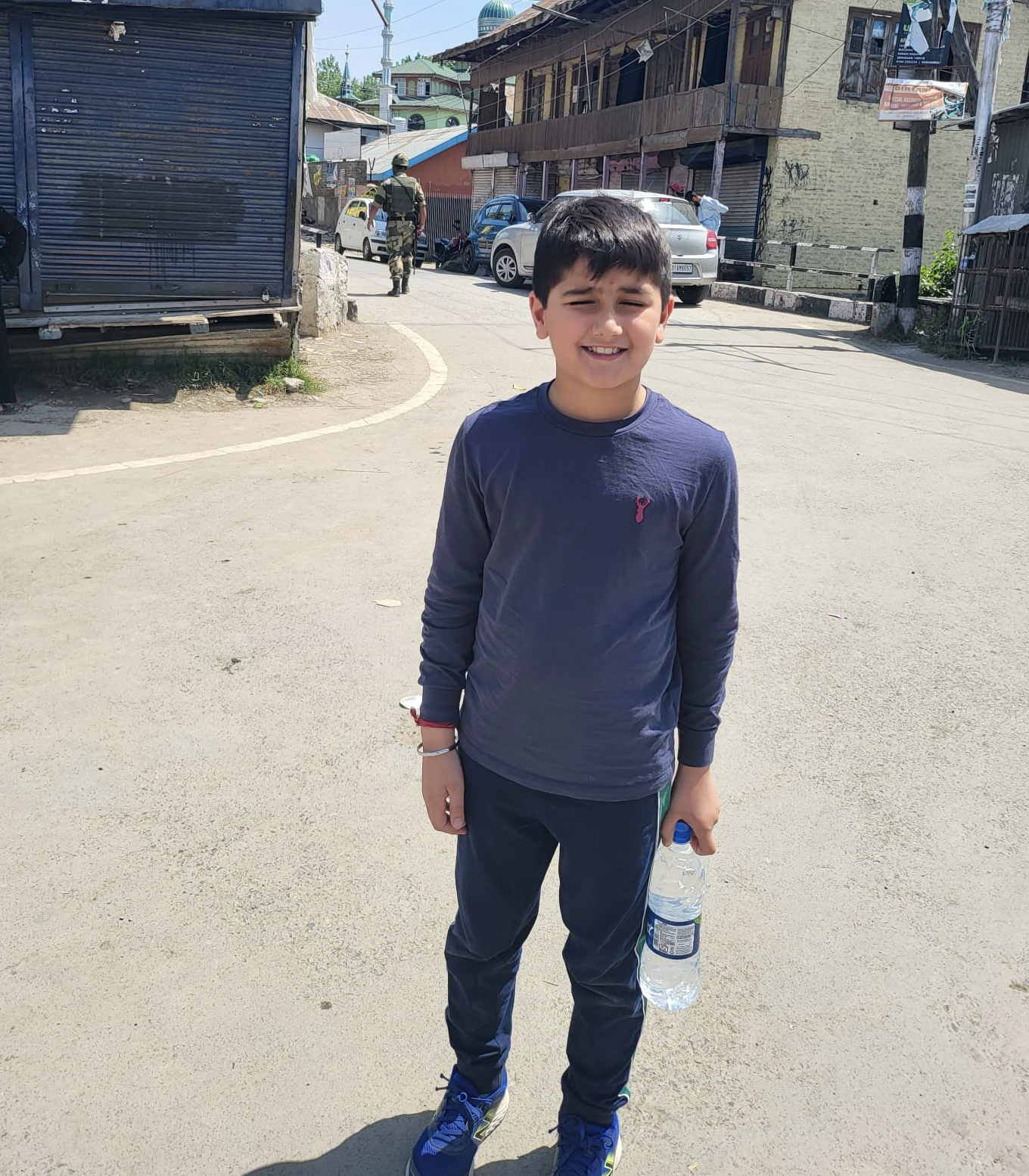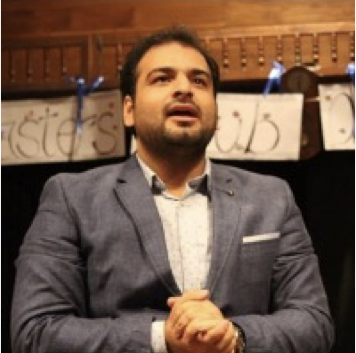
Suitcase Stories: Surinder Kaul
A suitcase holds more than just belongings—it carries dreams, determination, and the quiet resilience of those who dare to start anew. Suitcase Stories is a tribute to the remarkable journeys of our community members who left behind the familiar, crossed vast oceans, and built lives filled with purpose and ambition—not just for themselves, but for the generations that would follow.

Our journey begins with Surinder Kaul, who arrived in the UK in 1959 as a 19-year-old from Kashmir, his aspirations as towering as the Himalayas and as boundless as the ocean that now separated him from home. He came to train as an engineer, but life had other plans. Through perseverance and an unyielding drive to excel, he became a chartered accountant—a profession in which he would make history. Surinder became the first Indian ever elected to the Central Council of the Institute of Chartered Accountants in England and Wales, a testament to his resilience, intellect, and pioneering spirit. Through Suitcase Stories, we celebrate these extraordinary journeys—stories of hope, reinvention, and the unbreakable thread that ties past to present, homeland to new beginnings.
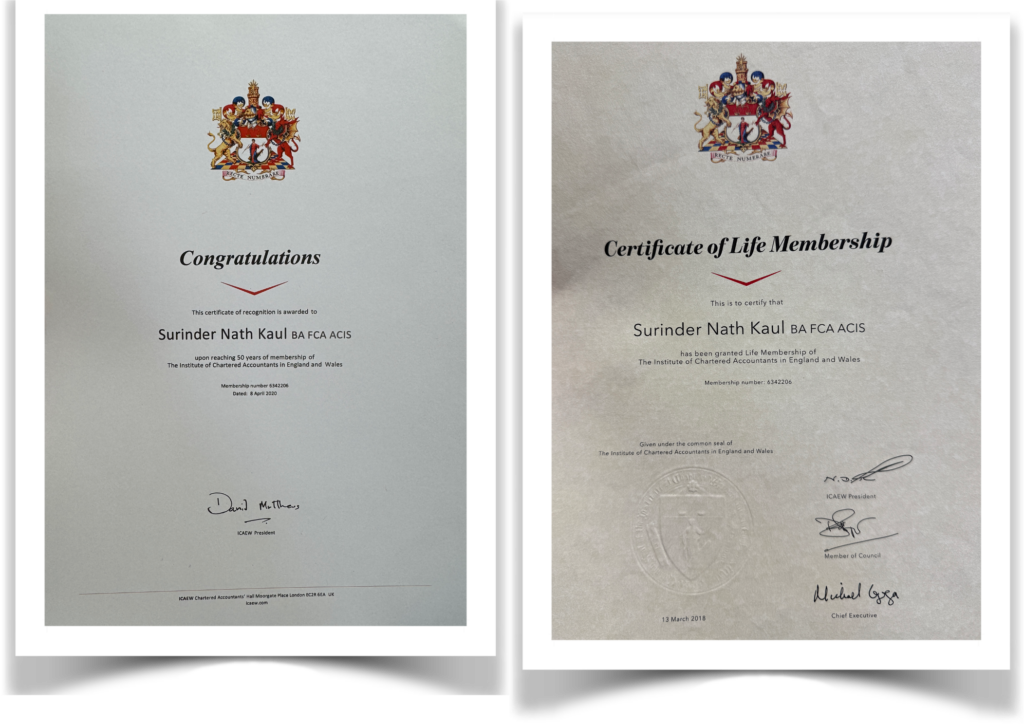
Engineering was the original plan. What drew you to it, and what was the moment you realised life had other plans for you?
Engineering was a natural choice because it was considered a prestigious and stable career back in Kashmir those days and I believe until recently it retained that honour. But life had different plans for me. Meeting Mr. Lambodar Zutshi changed everything. He saw something in me that I hadn’t seen in myself. He convinced me to pursue chartered accountancy, and in that moment, I took a leap of faith. Looking back, it was the best decision I could have made.
You mentioned Mr. Zutshi as a guiding force. Can you tell us more about your relationship with him?
Mr. Zutshi was more than just a mentor; he was like a guiding light in my life. He had a keen sense of people’s potential and an ability to steer them in the right direction. He didn’t just suggest accountancy—he actively helped me take the first steps, arranging training and opportunities. His support was invaluable, and I owe a great deal of my success to his wisdom and generosity.

Becoming a chartered accountant wasn’t an easy road. You had to try more than once. What kept you going during those moments of self-doubt?
It wasn’t easy and I failed a few times, but I never gave up. I attended night classes, studied tirelessly, and reminded myself why I was here—to create a better life. Every setback was a lesson, and every small success pushed me forward.
From a student to the first Asian president of the Institute of Chartered Accountants in England & Wales —that’s an extraordinary journey. Walk us through this journey?
Throughout my career, I have been fortunate to achieve several milestones that have shaped my professional journey. After qualifying as a Chartered Accountant in London, I worked with both national and international firms, handling key audits for some of the largest FTSE 150 companies listed on the London Stock Exchange. My career also extended to senior leadership roles in multinational corporations.
One of the defining moments in my career came when I was sent to India to establish Grant Thornton in the early 1970s. I was instrumental in setting up the firm’s operations in Delhi, serving as the senior leader responsible for establishing and expanding the practice. Over the four to five years I spent there, I laid the foundation for what is now a leading firm in India. While the firm has since changed its name, I continue to be involved with them as a consultant.
In the 1990s, I took a significant leap by setting up my own firm, focusing on consultancy and SMEs. Building a business from scratch was a major shift from the corporate world, but it proved to be a rewarding endeavour, leading to a highly successful international business and consultancy in London.
Another career highlight was being elected to the Central Council of the Institute of Chartered Accountants in England & Wales (ICAEW) in 2003, making history as the first Asian member to be elected to the body in its 125-year history. This was a significant moment not only for me but also for the broader community, as it brought greater diversity and representation to the profession.
Additionally, I founded the Institute of Chartered Accountants of India (ICAI) UK Chapter in 2001, fostering collaboration between the accountancy profession in the UK and Chartered bodies in India, Pakistan, Bangladesh, and Sri Lanka. I strongly believe in the importance of professional networks in promoting economic and financial integration, particularly within the South Asian region. These achievements reflect my commitment to both professional excellence and global collaboration, bridging industries and geographies to create lasting impact.

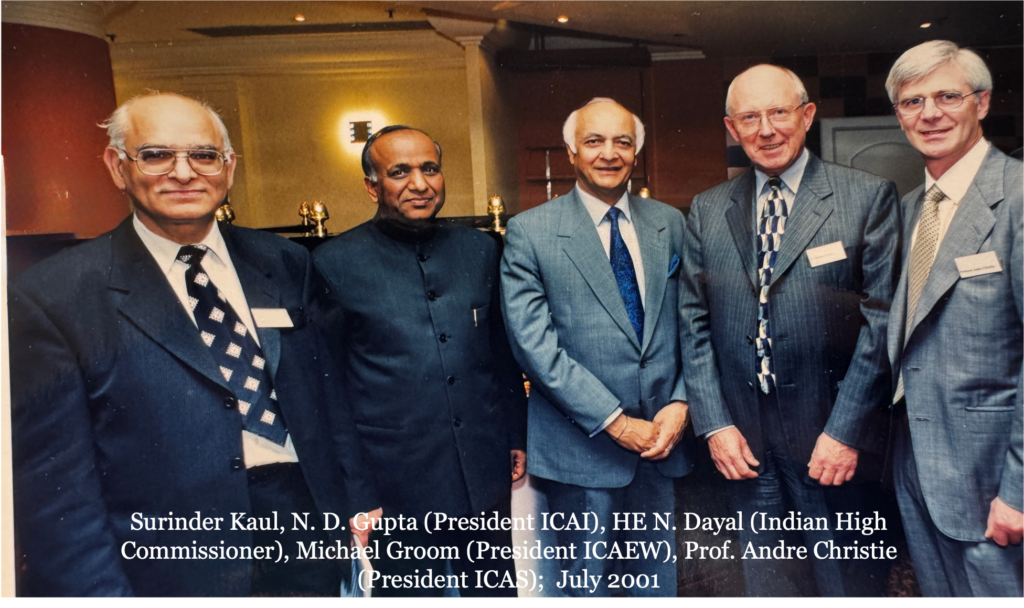
In a field where numbers rule, people often forget the human side of accounting. Was there a particular client or case that left a deep impact on you?
Yes, one case that stands out to me was my involvement in challenging a fraudulent pyramid scheme in the early 1970s. At that time, pyramid selling was a widespread but deeply flawed practice, often leaving people in financial ruin. I took legal action against Golden Chemical Products, a former pyramid-selling company, to recover money I had paid for goods under their scheme.
In 1975, at Willesden County Court, I successfully won compensation, making it one of the first legal cases of its kind to be brought against a pyramid scheme. I was able to reclaim £750 in compensation along with £250 for legal costs, setting an important precedent for others who had been misled by similar schemes.
This case was significant not just for me but for many others who had suffered financial losses. It reinforced my belief that accountants play a crucial role beyond just numbers—we are often at the forefront of financial justice, ensuring ethical and fair business practices.
You can read more about this case in the newspaper clippings from 1975, which provide further details on this landmark ruling.

How does the Kashmiri Pandit Association of today differ from the one you were part of in the 1960s?
The Kashmiri Pandit Association has evolved tremendously since its early days in the 1960s. When I first arrived in London in the late 1950s, there were no more than a handful of Kashmiri families, most of them students—perhaps seven or eight of us in total. The association, in its earliest form, was led by Lambodar Zutshi, his brother Balbadar Zutshi, and their family. They were the driving force behind bringing the small Kashmiri community together and creating a sense of belonging in a foreign land.
Back then, the community was small, but tightly knit, and primarily focused on supporting one another as new immigrants. There were no established structures or dedicated spaces for gatherings. It was through the dedication of the Zutshi family that the foundation of what later became the Kashmiri Pandit Association of Europe (KPAE) was laid.
Today, KPAE has grown into a well-established and thriving organization. The numbers are remarkable—what was once a community of just a few families has now expanded significantly. What we need now is a home of our own—Kashyap Bhawan—which has been a dream for many of us for a long time. The community today has the resources to build it, and we can easily organise the necessary funds to make this vision a reality.
This transformation reflects not only the growth of the Kashmiri community in the UK but also the commitment of generations who have continued to build upon the legacy started by those like Lambodar Zutshi. While the sense of togetherness remains at the heart of KPAE, it now has the infrastructure and reach to make an even greater impact on the lives of Kashmiri Pandits in the diaspora.
Growing up in Kashmir, do you miss your homeland, and how do you maintain connections with your roots?
Of course, I miss Kashmir—the mountains, the culture, and the warmth of home. I stay connected through community events, by visiting whenever possible, and by supporting initiatives that help Kashmiris abroad.
What are some of the most unforgettable adventures you had during your early days in London?
During my early days in London, some of my most unforgettable adventures involved escaping the city with the mountaineering club. On bank holidays, I would set off to explore the stunning landscapes of the Lake District, Wales, and Scotland, spending my time hiking, walking, and camping. Being immersed in nature gave me a profound sense of familiarity and connection, reminding me of home.
Another memorable experience was hitchhiking to Germany to visit my brother. Travelling was a huge part of my life at the time—it expanded my perspective on the world. Those journeys, both within the UK and beyond, were filled with excitement, discovery, and a wonderful sense of freedom that still makes me smile today.
Is there a specific message you would like to share with our youth?
Understanding and staying connected to our roots is essential. Though my family is spread across the globe—in the US, UK, Hong Kong, and India—our origins remain in Srinagar. We still maintain our family home in Kashmir, and I am committed to preserving it as a way of honouring our heritage. For the Kashmiri Pandit community, in particular, it is vital that we do not lose our connection to Kashmir. Our roots shape our identity, and we must keep our traditions, culture, and history alive for future generations.
As you navigate life, remember that change is inevitable, and growth requires adaptability. Not all dreams are realized immediately, but perseverance is key. Take time to reflect on your journey, much like an accountant reviewing a balance sheet. Keeping track of your progress allows you to see how far you’ve come and where you need to go.
Just as a well-maintained balance sheet reflects financial health, a clear personal balance sheet—one that tracks your achievements, setbacks, and lessons—helps ensure you are moving forward with purpose. Set clear goals, regularly review your progress, and strive for balance in all aspects of life. Embrace challenges as opportunities for growth, make the best of every situation, and always stay true to your values.

If you could speak to that 19 year-old boy who landed in London all those years ago, what would you tell him?
I would tell him, “Believe in yourself. There will be struggles, but don’t be afraid. Every challenge is an opportunity, and hard work will take you further than you ever imagined.”
In one sentence, how would you summarise your journey and the legacy you hope to leave behind?
My journey has been one of resilience, transformation, and breaking barriers, and I hope my legacy is one that inspires others to pursue their dreams fearlessly.

